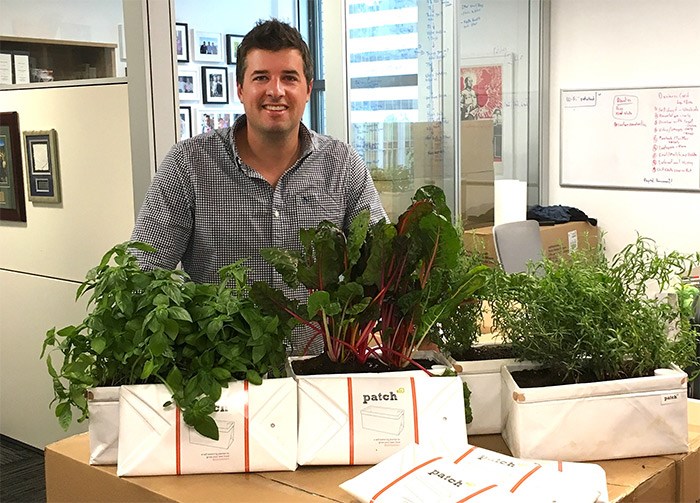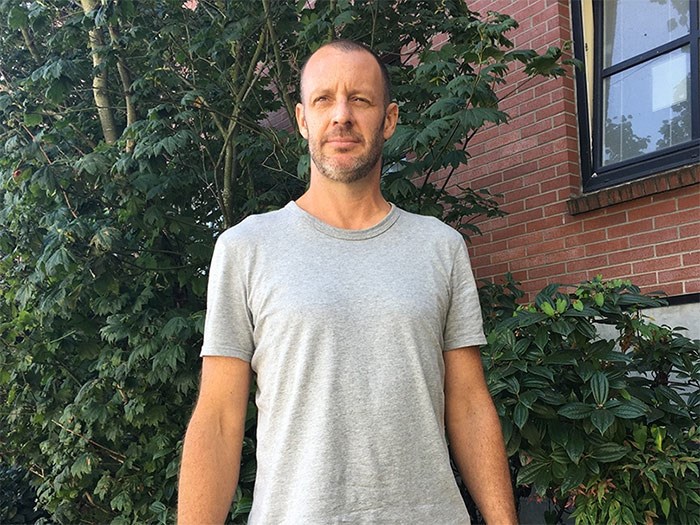 Patchâs new owner, David Woodward, revived the failed Â鶹´«Ã½Ó³»Kickstarter project and says he has fulfilled roughly 85 per cent of the campaign. â Contributed photo
Patchâs new owner, David Woodward, revived the failed Â鶹´«Ã½Ó³»Kickstarter project and says he has fulfilled roughly 85 per cent of the campaign. â Contributed photo
Answers, and, in some cases, planters, have finally started to flow for supporters of a four-year-old local Kickstarter campaign.
In 2013, riding the wave of the grow-your-own-food movement, Patch Planters founder and urban agriculture advocate Kent Houston successfully raised more than $50,000 towards the manufacture of his stylish, locally designed, self-watering indoor herb planters.
People who contributed $29 or more to the effort were told they would receive one of the compact, white, collapsible planters.
Things fell apart shortly after, however, when Houston seemingly disappeared with the Kickstarter campaign funds, and without fulfilling any of the promised campaign rewards. The campaign was estimated to deliver in July of 2013. By January of 2014, the 639 campaign backers still hadnât received any planters or other rewards, and campaign email updates from Houston had dried up.
Unhappy comments flooded the campaign message board and Patch Facebook page. They, too, went unanswered, fuelling the ire of the Patch and Kickstarter communities.
Westender got wind of the issue and was the first to report the details surrounding the wayward Kickstarter campaign and MIA local entrepreneur but, without comment from Houston, supporters could only speculate as to what had happened to the funds, or to the companyâs creator.
Then, two weeks ago, a local businessman named David Woodward reached out via email saying he, under the Patch brand, was now fulfilling the campaign and mailing out planters to every Kickstarter supporter that they had been able to contact.
A few days later, Houston also reached out to the Westender, looking to tell his side of the story. According to Houston, just as Patch was reaching its peak of popularity, a personal battle with addiction and anxiety was also taking root.
 Patch founder Kent Houston says he was clean when he launched the Kickstarter project, but struggled before and after with addiction issues. â Kelsey Klassen photo
Patch founder Kent Houston says he was clean when he launched the Kickstarter project, but struggled before and after with addiction issues. â Kelsey Klassen photo
âI put a lot of pressure on myself,â Houston begins, speaking with Westender in a coffee shop near Olympic Village, sporting a crisp grey T-shirt, stylish sneakers and some stubble. âI started [my prior company,] Houston Landscapes, on a shoestring. I did very well with it and I thought I was smarter than I was, and I was probably more ambitious than I should have been.
âReally, I wanted to be, like, the Steve Jobs of urban agriculture,â he says, with a laugh.
Just before starting Patch, though, he broke his collarbone in a skiing accident and was given a prescription for painkillers, setting off a dark chapter in what he characterizes as a lifetime of highs and lows.
âI knew there were dangers with Percocet and OxyContin,â Houston admits. âI had no idea the extremity of those dangers, but it relieved my stress and my anxiety. I was just like, âAhhhh. Now Iâm on this warm fuzzy cloud and I can start this business from here.ââ
Houston remained addicted to OxyContin for two years, taking upwards of 160mg a day, before quietly getting clean with a doctor-assisted home detox prior to the launch of the Kickstarter campaign.
In hindsight, that approach was a mistake, he says. When he filmed the campaign video for Patch, he says he was broke, depressed, and still experiencing severe side effects of the withdrawal and detox medication.
âI was just pretending everything was fine when I was just unravelling inside,â he recalls.
When asked directly, Houston says he did not launch the Kickstarter campaign with the intention of using the money for drugs. Rather, he says things went sideways when, after paying the Kickstarter fees and reimbursing some friends who had artificially bolstered the campaign, he didnât have enough money to actually manufacture and ship the planters.
âWhen it all shook out and Kickstarter took their cut and I paid [the other] money back, what was left in the bag was not enough to fulfill the campaign. Now, if I had have been of sound body and mind,â he pauses, âthe obstacle wasnât that large. I wasnât that short. I could have figured it out⦠but I was basically going through a nervous breakdown.â
Houston says the shame of the failure was crippling, and his response was to go silent. He ignored the mounting concern of the campaign backers. He ignored the Facebook messages. He ignored the media requests. He spent the money.
But it did not go away.
âI didnât know what I was going to do,â he says. âI was just basically hoping that some magical thing would happen â the sea would part and I could walk across it â but, of course, we know that never happened.â
 Patch Planters garnered more than $50,000 in support during a 2013 Kickstarter campaign, however complaints soon surfaced on social media that supporters never received their products. â Contributed photo
Patch Planters garnered more than $50,000 in support during a 2013 Kickstarter campaign, however complaints soon surfaced on social media that supporters never received their products. â Contributed photo
Instead, Houston turned to alcohol. He avoided his familiar haunts and spent the year after the campaign relying on the support of friends for housing and employment. A friend checked him in to rehab on the Island in spring of 2014, but relapses ensued. For two months, he was even homeless, living in Victoriaâs Rock Bay.
All the while, Houston was, in his own way, attempting to bring Patch to fruition.
âMy struggle with sobriety is, Iâve been trying to get Patch off the ground on my own. I canât borrow any more money. Like, maybe I could, but I just canât. Iâve been trying to do it on my own, Iâve tried to partner with different people, and every time that it falls apart or the rug gets pulled out from underneath me and I canât get Patch off the ground again? I just go dark,â he explains. âI drink to go dark.â
Thatâs when David Woodward stepped in. Woodward, who owns a small manufacturing firm in Vancouver, had been recruited as the manufacturing agent for Patch around the launch of the Kickstarter. He was caught off guard by Houstonâs disappearance, but, when they reconnected 18 months ago, he says he had enough faith in the product to still want to find a solution.
âWe kind of became friends a little bit,â Woodward says, speaking with the Westender by phone, âand I was like, itâs such a great product, it would be such a shame to see this thing you know die with the Kickstarter campaign unfulfilled, so [Kent] basically handed it off to us and weâre now fulfilling the campaign.â
Houston is not currently involved, save for being an enthusiastic supporter, and Woodward estimates that he and the new team have honoured about 85 per cent of the original campaign, and are waiting to hear back from the remainder.
The Kickstarter supporters who returned to leave messages on the campaign wall were, for the most part, pleased and surprised.
âYes! I received my Patch today. It was surprising, but welcome. Hard to believe, but nice. Anyway, I do appreciate the actual delivery of the product. Thanks to the new company!â wrote Robert Erlick.
âGlad to see things are getting back on track. I made the decision to support this knowing the risks. Sometimes these things donât work out, and Iâm very pleased to see that this has finally got started again. Wishing the new Patch team all the best!â shared Keira Roth.
While others wrote that they had moved on, lost interest, or would prefer a refund.
Woodward has manufactured a few thousand of the planters at this point, which are for sale on the new site at patchplanters.com, and he says he plans to grow the business with additional products and accessories.
For him, it was a conscious decision to keep the brand despite the notoriety.
âI think the design and branding was very good, and, to Kentâs credit, I think he did a really nice job on a lot of stuff,â Woodward says. âI think that speaks to the fact that it got funded on Kickstarter and so many people were behind it. Honestly, I really liked it from day one⦠The original concept was built around that brand, and we wanted to, kind of, carry through with his original intent.â
Houston says seeing the planters delivered is an unquestionable relief. âItâs like a 1,000-lb weight has been lifted off my back,â he states. âI call it âgetting rid of my shame monkey.â... That [people are] getting them, it is an enormous relief.â
When asked if he is apologetic for how he handled the whole affair, his answer comes quickly: âIâm not apologetic; Iâm sorry,â he says. "Sorry comes with pain.â
âIâm sorry to the whole crowdfunding community,â he adds later. âWhenever someone like me does what I did, it damages everybody elseâs chances to be successful.â
© 2017 Â鶹´«Ã½Ó³»Westender


